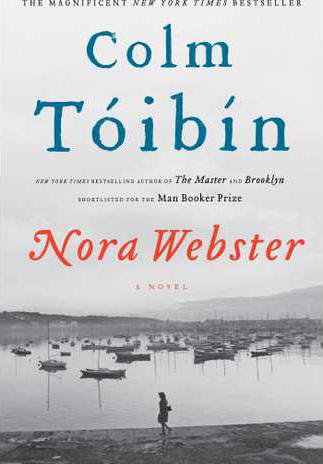"NORA WEBSTER," by Colm Toibin, Scribner, $16, 373 pages (f)
In a fast-paced media world, Irish author Colm Toibin's "Nora Webster" seems in a place all its own with its spare style and somewhat meandering pace that recalls real life instead of action movies or paperback thrillers. The novel begins in 1969, in the author's hometown of Enniscorthy, Ireland.
Nora Webster is a recently widowed mother of four. At first, she's lost outside her old life, described as "a life of ease. The day belonged to her, even if others could call on her, take up her time, distract her. Never once, in the 21 years she had run this household, had she felt a moment of boredom or frustration." Now she must learn to cope without her adored husband, Maurice, who was a schoolteacher and died of tuberculosis. Her children, two teens and two young adults of college age, are needy in their own ways, and Nora tries to help them, as well as herself, to grieve and move on.
The prose matches her straightforward manner in going about this: Being released into the world of others seemed impossible; it was something she did not even want. Descriptions of thought and action are precise and serene.
Step by slow step, the reader sees Nora challenge herself to do what must be done. Rather than having a grand story arc, "Nora Webster" shows a slice of life, examining an ordinary woman and her journey to recover from her loss. At times, her courage is admirable. At other moments, she's downright unlikable.
Toibin writes in a clear, unadorned style with a literary feel. He does so without including any swearing, described violence or sexual content.
This book, Toibins 10th novel, was recently re-released in paperback, and it was recognized as a New York Times Notable Book of 2014, one of the Christian Science Monitor's Top 10 Books of 2014, and one of NPR's Best Books of 2014.
In a fast-paced media world, Irish author Colm Toibin's "Nora Webster" seems in a place all its own with its spare style and somewhat meandering pace that recalls real life instead of action movies or paperback thrillers. The novel begins in 1969, in the author's hometown of Enniscorthy, Ireland.
Nora Webster is a recently widowed mother of four. At first, she's lost outside her old life, described as "a life of ease. The day belonged to her, even if others could call on her, take up her time, distract her. Never once, in the 21 years she had run this household, had she felt a moment of boredom or frustration." Now she must learn to cope without her adored husband, Maurice, who was a schoolteacher and died of tuberculosis. Her children, two teens and two young adults of college age, are needy in their own ways, and Nora tries to help them, as well as herself, to grieve and move on.
The prose matches her straightforward manner in going about this: Being released into the world of others seemed impossible; it was something she did not even want. Descriptions of thought and action are precise and serene.
Step by slow step, the reader sees Nora challenge herself to do what must be done. Rather than having a grand story arc, "Nora Webster" shows a slice of life, examining an ordinary woman and her journey to recover from her loss. At times, her courage is admirable. At other moments, she's downright unlikable.
Toibin writes in a clear, unadorned style with a literary feel. He does so without including any swearing, described violence or sexual content.
This book, Toibins 10th novel, was recently re-released in paperback, and it was recognized as a New York Times Notable Book of 2014, one of the Christian Science Monitor's Top 10 Books of 2014, and one of NPR's Best Books of 2014.





